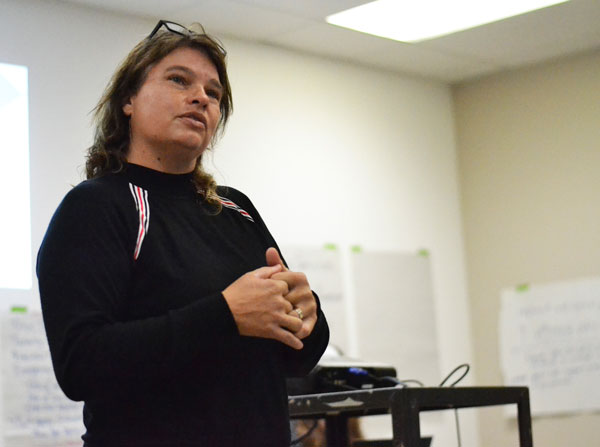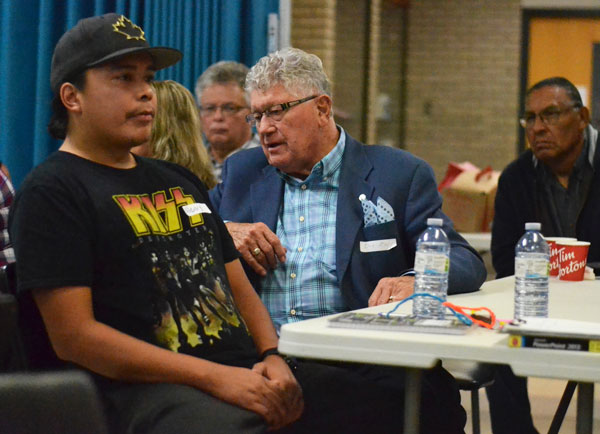
Community meeting sheds light on getting first-hand perspectives from homeless people for action plan
“You still hear an opportunity for hope, so if we lose that, we’re done for.”
– Lenore Swystun
Henry Morin seemed slightly hesitant when he first stood up with something to say at a community meeting on reducing homelessness on Friday.
He had just listened to other people’s opinions on what more needs to be done to slow the rising issue in Prince Albert.
“Can anybody tell me what this whole place is missing right now?” he asked.
After several seconds of silence, Morin answered his own question: “We’re missing the homeless people.”
“I know there’s a lot of organizations here right now,” he said, but “if we get the answers directly, right from the homeless, right from a struggling mother on welfare, not able to afford housing, that’s the core place where you can get your answers from.”
“Take that time, that effort, to talk to a homeless person on the sidewalk and really ask them ‘What led you here? How did you end up here? What could I do to help?’” he asked. Half way through saying this, Morin paused with tears slowly forming in his eyes. He had to take a breather.

This sparked Lenore Swystun, founding director of Saskatoon-based Prairie Wild Consulting, to give an honest summary of what people struggling on the streets have to say.
Members from Prairie Wild Consulting led the meeting, along with Brian Howell from the River Bank Development Corporation, which spearheaded the project called Reaching Home.
Swystun’s role in the researching process was to talk to homeless people themselves. They also conducted dozens of one-on-one interviews with people from relevant organizations.
She explained that she sat with two women, one who had a child, and asked why they were on the streets.
“What do they tell me?” Asked Swystun. “’It’s hard to get out of this because drugs are an issue. There’s gang activity everywhere. If it wasn’t for the YWCA, I’d be dead right now.’ Both of them said that.”
She then asked what they needed and how she could help.
“’Give me some place where I can put my head to rest all year round. Not just a winter shelter.’ Some of them didn’t know on the streets that the winter shelter was even there,” she explained.
“Second: ‘Give me food, give me clothes because we have a food crisis in this city. I can’t find a place for food, so if you’re wondering why we’re stealing, it’s because I can’t find a place to get food.’ That was a huge one.”
Swystun went on to say that homeless people in the city told her there’s not enough support services for homeless youth and seniors, some were kicked out of their First Nations communities because of bad behaviour and are trying to improve and that there’s not enough beds in detox centres. She said homeless people are well aware of the correlation between poverty and mental health and addictions.
“But I’ll tell you, the most crucial thing that they said is they want to feel like human beings. Even if they’re on the god damn street, (they say) ‘Look at me as a human being, not as a piece of garbage,’” she said.
“If I’m asking for food and I’m asking for clothes, it’s because I need them,” said Swystun. “Let me have that dignity.”
She said no homeless people want to be in their situations—sleeping in a different nook every night, or with family or friends who only take them in once and then send them off to find a different place to keep warm.
“It’s heartbreaking on the one hand, but I have to say something else to leave this on an ‘up’ note. They were so grateful that they knew there were folks coming together in (this) room, because I told them, that had their best interests at heart,” said Swystun.
“You still hear an opportunity for hope, so if we lose that, we’re done for.”
Swystun said what people were proposing in the meeting does echo what people on the streets are saying. A few things people in the meeting said Prince Albert needs to have are 24/7 transit, more education on where to find help, better management for affordable housing and better access to necessities such as food and clothing.
A few of the roughly 50 people in attendance were Doug Kinar from the Canadian Mental Health Association, Jason Stonechild from the police service, Edna Bruce from Our House, Janet Carriere from the Indian Métis Friendship Centre and Deputy Mayor Don Cody.
Swystun concluded by addressing Morin for bringing up the importance of talking to homeless people first-hand.
“Thank you, because that’s exactly it. Just go out on the street. Listen, look, help, spread the word.”

